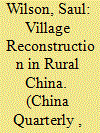|
|
|
Sort Order |
|
|
|
Items / Page
|
|
|
|
|
|
|
| Srl | Item |
| 1 |
ID:
192599


|
|
|
|
|
| Summary/Abstract |
China’s rapid urbanization has generated a substantial population of “landless peasants,” villagers whose farmland has been fully expropriated. The fate of these “landless peasants” has varied greatly from locale to locale. In many cities, they have become wealthy urban landlords; in others, they have been pushed aside in the urbanization process. When they have become urban landlords, they have often done so through the formation of village collective shareholding corporations and villages-in-the-city (chengzhongcun 城中村, also known as “urban villages”), which have in turn provided housing for many migrant workers. Through a comparison of Guangzhou, with its many villages-in-the-city and powerful village collectives, and Shanghai, with far fewer villages-in-the-city or village collectives, this article argues that these starkly divergent physical, institutional, and distributive outcomes have been the result of divergent municipal policies that seek to urbanize peasants in very different ways. In both Guangzhou and Shanghai, although these urbanization policies were rooted in path dependency and local culture, they were subject to abrupt change by municipal leaders with new ideas.
|
|
|
|
|
|
|
|
|
|
|
|
|
|
|
|
| 2 |
ID:
166875


|
|
|
|
|
| Summary/Abstract |
Using examples from village reconstruction programmes in rural China, we show that local cadres often prioritize project visibility over publicized policy goals. While central policies and the academic literature emphasized land reclamation or rural welfare, local cadres – and the projects they designed – tended instead to focus on projecting an image of urban, wealthy villagers. Where such image-driven behaviour is most deleterious to villagers, it can evince opposition. We observe that some areas avoid conflict by making these projects voluntary or adjusting projects to local conditions. However, we provide a case study of a village with strong village leadership, showing that contrary to recent claims that village cadres are increasingly impotent, some maintain the authority to override widespread objections from villagers.
|
|
|
|
|
|
|
|
|
|
|
|
|
|
|
|
|
|
|
|
|